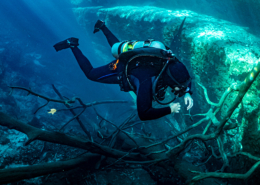Sea Legs and How to Get Them
By Gemma Smith
Most of us have been there at some point in our diving journey. I know that I have, on more occasions than I would like to remember! First comes the initial excitement of going out for an awesome boat dive. Your gear is prepped and loaded on board, your buddies are ready, you start motoring out…and then it starts. The slight upset feeling in the stomach, followed by sensations of cold sweats. and then, often, by general misery. Oh yes, motion sickness (also known as sea-sickness or ‘Mal de mer’) is no laughing matter. It can run the whole range of outcomes, from being mildly unpleasant to being utterly disabling. I know that at the start of my diving career that I missed so many dives when out on a boat in the choppy waters of the English Channel. The problem is, there is so much amazing diving to be done from boats! I didn’t want to give that up. Over the years I have tried and tested various methods that can lessen the effects of motion sickness, and in this article, I want to look at some of the causes of seasickness, as well as what you can do to prevent it.
So what is motion sickness?
In simple terms, motion sickness is a very common disturbance of the inner ear due to a repeated motion. Several factors in the body all work together to ultimately make you feel less than your best. It’s a phenomenon that involves your vestibular system (this is the twists and turns within your inner ear, and it plays an important part in the control of your equilibrium), your cerebellum (a part of the human brain that has many jobs, but specifically in this instance, it controls balance), the gastrointestinal tract, and the nerve connections between the inner ears and the eyes. The sickness is caused by a mismatch of information received from several sources. Anyone can develop motion sickness. It is, however, true that different people often have a different level of tolerance. We see motion sickness all the time in kids, but, interestingly, pregnant women, and people who have a history of migraines are all more likely to suffer from it. Then, of course, there’s us: divers who like to go boat diving, even when our bodies don’t quite have our sea legs sorted yet.
What are the symptoms we can look out for then?
Oh, we have a whole range of possible effects of seasickness:
- Nausea
- Vomiting
- Often a marked paleness of the face (pallor)
- Shortness of breath
- Dizziness
- Drowsiness
- Sweating, often cold sweats
- An overall feeling of discomfort
- Just not feeling well (a feeling of malaise)
So how can we prevent (or at least lessen) the effects of sea-sickness?
- I’ve found that one of the key things that works for me is avoiding certain foods and drinks before I go boat diving. Lay off the alcohol the night before, as this will only dehydrate you. I’ve found that skipping my morning milky coffee also works wonders. Those with a sensitive stomach may find that leaving out all dairy products that morning will help. Heavy, spicy, or greasy foods are often best-avoided too. With that being said, it is important to not go out on an empty stomach. Have simple or bland meals, eat little and often, and stay hydrated! Dry and plain crackers are a good choice. Sometimes it is worth trying ginger tea, or even nibbling a little bit of ginger. Ginger is a well-known and trusted natural remedy for motion sickness. Peppermint tea has a similar calming effect on the stomach. Some people also find that taking small sips of a carbonated drink will help.
- Make sure you are well rested from the night before. Tempting as it is to stay up late and enjoy the social side of your dive trip, it won’t help you feel better the following morning. Being fresh for diving will markedly lessen your susceptibility to feeling unwell when out on the boat.
- Get some fresh air. Although all you may sometimes want is to hide away in the cabin, especially when the weather just isn’t that great, it is one of the worst things you can do. Get out on the deck and let the fresh air do its healing work. Just as long as you stay well away from the diesel fumes from the engine, it will make a world of difference. It is also worth thinking about your position on the boat. Oftentimes the middle of the boat will be the most stable, especially if seas start getting rough. Also, when you’re on the boat, don’t get overheated. Keep cool and stay under a sunshade if necessary. Try and avoid putting your exposure protection suit over your head, whether that be a wet or drysuit, until absolutely necessary. This is especially true if your suit has a particularly snug neck seal.
- Try looking at the horizon. Pick a point, and focus on it. Look out so your eyes can register the same type of movement changes that your ears are reporting. It’s worth making the effort to avoid reading or checking your phone, reading a book, or looking at instruments or gauges too much. It will only add to your body’s conflicting signals. This is also why it is a smart move to have all dive gear ready to go beforehand, so you aren’t having to build your dive set more than needed on a rocking and rolling boat.
- Think about applying some pressure. Sea-bands have been around for years. Basically, it is an elasticised wristband. There is a small stud on the band which applies pressure over the Nei-Kuan point (located within tissue about 3 centimetres above the wrist joint). The Nei-Kuan point is thought to have some control of nausea and vomiting. To be most effective it is important that a band is worn on each wrist, and ideally put on before the start of the journey. Many people swear by them, but that being said, there are currently no controlled trials on this technique.
- There are lots of medications on the market for helping with motion sickness. Make sure you do your research before picking one at random, though. Some can have side effects not compatible with diving. I personally try and avoid them, but make sure you contact a diving doctor or do some research on what DAN recommends before you make the decision to use medication.
- Remember, as disappointing as it is to miss a dive if you are feeling really unwell, don’t think that getting in the water is always the best idea. While the mild nausea that you have on the boat may lessen when in the water, it will take time. It’s not fair to either yourself or your buddies to put them in the position where the dive needs to be called. While vomiting underwater is possible, it is not something you should ever knowingly take a chance on. Especially in the less experienced divers, it may cause confusion and panic. That’s how dive accidents happen.
These are just some of the many possibilities for limiting your reaction to motion sickness. Unfortunately, there is no one magic cure for ‘Mal de mer’. What works on one dive may not work at all on a subsequent dive. The important thing is to plan ahead, especially if you know you are prone to feeling queasy anyway. Your preparations and possible behaviour from the night before can really have an impact on how much you enjoy your following day of diving. It is also worth pointing out that you have to be aware that what you believe may be seasickness is possibly hiding other conditions. Feeling unwell before the dive may be quite normal for you, but monitor yourself if you start feeling less than great when you surface. If you feel dizzy, nauseous, or generally unwell, it is possible that it is a sign of decompression sickness, particularly related to the central nervous system or a vestibular problem. It’s important to remember that there is nothing to be embarrassed about if you are sick. It’s a symptom that most seafarers will have suffered from at some point in the past, the present, or even the future! Don’t laugh it off. Stay aware and focused, and most importantly of all, stay safe.










發表評論
想加入討論?隨時歡迎參與討論!